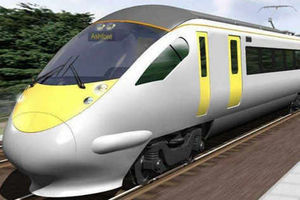Consultation starts on £30bn high-speed rail link
A consultation into plans for the controversial £30 billion HS2 high-speed rail project was officially being launched by the Government today.

A consultation into plans for the controversial £30 billion HS2 high-speed rail project was officially being launched by the Government today.
Transport Secretary Philip Hammond said the line, initially running from London to Birmingham, will bring £44bn worth of benefits and slash journey times between the capital and other major cities by as much as an hour.
Campaigners were today lighting beacons to highlight their opposition. The 140-mile first phase is expected to cost around £17bn.
And there are plans for extensions north of Birmingham to northern England and Scotland. It would create 40,000 jobs while trains will travel at up to 250mph on the new line.
But the first phase passes through beauty spots, including hamlets and villages in Staffordshire.
About half the planned route has been altered and it will miss Lichfield and Whittington after opposition.
It will run parallel to the M40 motorway, passing west of Coventry before entering Birmingham from the north.
The consultation into the scheme was being launched today by Mr Hammond at Birmingham's ICC. It will see a series of roadshows between London and the West Midlands until July 29.
Mr Hammond said: "We must invest in Britain's future. High speed rail offers us a once-in-a-generation opportunity to transform the way we travel in the 21st century and would help us build a modern economy fit for the future.
"We cannot afford to be left behind, investing in high speed rail now is vital to the prosperity of future generations."
The consultation was today being launched as the Department of Transport published results of a government-commissioned survey into the plans revealed 47 per cent of people are in favour of the scheme, nine per cent are opposed and 44 per cent undecided.
The head of the Lichfield Action Group opposing the scheme spoke out against Mr Hammond's plans to spend £215 million on noise pollution research. Ian Wilde said that it was "mind blowing" and called for the project to be scrapped.




